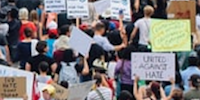Summary of
Accounting for War Crimes in Cambodia
By the United States Institute of Peace
This Article Summary written by: Tanya Glaser, Conflict Research Consortium
"Accounting for War Crimes in Cambodia". Peace Watch. United States Institute of Peace. Vol. 1, No. 6. Pp. 1-3.
The article describes the issues discussed during a conference on war crimes in Cambodia. The Khmer Rouge, an extremely nationalistic communist organization, took power from the US supported government of Lon Nol in 1975. April 17, 1975 was declared the beginning of the year "Zero" of a new age "in which there would be no families, no schools, no books, no learning, no holidays, no music -- only work and death" (p. 2). Three million people were resettled to rural areas from the capital and a campaign to eliminate of any signs of the country's colonial and royalist past began. During the 1975-1979 genocide two million people perished. In 1993 the Khmer Rouge boycotted the elections. Its destabilizing actions continue to threaten the new regime. Prosecution of Khmer Rouge leaders might further destabilize the country. Thus, current Cambodian leaders are faced with the dilemma of whether to pursue justice or stability. Conference participants agreed that for reconciliation to happen, the Khmer Rouge should be prosecuted for its crimes. There are several options available: creation of international criminal tribunal, "a non-criminal proceeding before the International Court of Justice, domestic prosecution before Cambodian Courts and the establishment of an international commission of inquiry which would gather material for further prosecution (p. 3). Conference participants emphasized that the international community cannot implement any actions without support from the Cambodian people and government. The first step would be to assemble the evidence of violence committed by the Khmer Rouge, then to bring the leaders of the party to justice. This would create a precedent of accountability which could prevent this from happening again and encourage the process of reconciliation and healing for those who suffered from the old regime, and for the Cambodian people in general.










